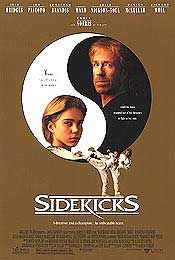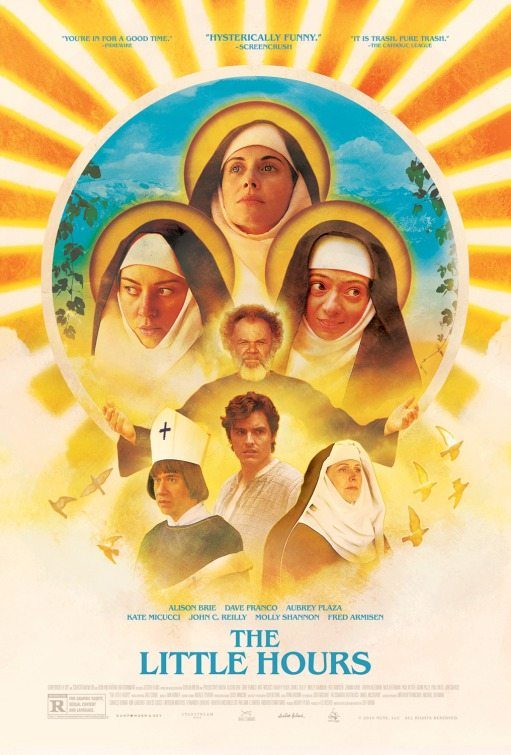“Quirky Satire Attacking Medieval Catholic Legalism and Piety”

| None | Light | Moderate | Heavy | |
|---|---|---|---|---|
| Language | ||||
| Violence | ||||
| Sex | ||||
| Nudity |
What You Need To Know:
The comedy doesn’t always work in THE LITTLE HOURS, which is too quirky. Besides some “f” bombs, the movie is quite lewd as the nuns pursue their lusts for Massetto and another nun becomes quite unhinged. THE LITTLE HOURS has a strong Romantic, lawless worldview that strongly attacks and lampoons Christianity. That said, a visiting Bishop comes across as sincere when he admonishes Father Tommasso and the nuns for giving into their lust. Even so, the ultimate message of the abhorrent LITTLE HOURS is to indulge the “pleasures of the flesh.” LITTLE HOURS also relegates faith and morality to a minor role.
Content:
(RoRoRo, FRFRFR, ABABAB, C, B, OO, HoHo, LLL, VV, SS, NNN, AA, MM) Very strong Romantic, lawless/antinomian worldview contains a very strong attack against Medieval Catholic legalism and piety, although the Catholic Bishop appearing in the movie projects serious sincerity as he strongly admonishes four very sinful nuns and a very sinful priest, plus one nun turns out to belong to a secret witchcraft coven dancing around a fire in the forest, and she later tells another nun when asked that the nun probably would make a very good witch, and the same nun seduces that nun into kissing her and fondling one another; about 34 obscenities (more than half “f” words), three strong profanities and three light profanities; strong and light comical violence includes three nuns pummel handyman and gardener with turnips while beating and kicking him and verbally abusing him, nun screams at deaf worker to see if he’s really deaf, man threatened with execution, nun threatens man with knife to force him to fornicate with her and her friend, witch threatens man with being sacrificed, but it appears she may not be serious, and he lives; depicted and implied fornication and adultery, depicted lesbian kissing and fondling between nuns dressed in nightgowns, confession of sodomy, it’s implied that a Catholic priest has been sleeping with the head nun at a convent, nude dancing at a witches bonfire; total frontal female nudity during a witches bonfire at night in the forest and images of upper and rear male nudity; alcohol use and drunkenness; no smoking; and, priest and nuns lie, man lies, nuns are mean to a servant, one nun is mean to two servants, nuns are rude, and a woman’s rich father is stingy and doesn’t want her to marry because he doesn’t want to spend money on her dowry.
More Detail:
In the original story from THE DECAMERON, a handsome young peasant, Massetto, pretends to be a deaf mute so he can work for a Medieval Catholic convent containing eight young nuns and a young Abbess or Mother Superior. The peasant becomes a secret lover of the eight nuns, then also the lover of the Abbess. He lives there until she dies, fathering many children. Basically, the story is a condemnation of corruption within the Medieval church.
In this movie version, however, the convent is run by Father Tommasso who comes across the handsome Massetto in the forest. Massetto has run away from his harsh lord, because he’s been sleeping with his master’s wife.
Tommasso and Massetto get drunk on some sacred, sanctified wine, and Tommasso asks Massetto to come work for the convent, to replace the convent’s day laborer, who ran away because of the harsh treatment he received from three of the convent’s young nuns. The three cantankerous nuns include Ginevra, a gossip and tattle tale, Fernanda, a caustic wit, and Alessandra, who wants to leave the convent and get married, but her stingy rich father doesn’t want to spend any money on a dowry for her.
Father Tommasso tells Massetto he should pretend to be a deaf mute to discourage temptation. However, that’s easier said than done.
Pretty soon, Massetto is fornicating with Fernanda and her friend from the village, Marta. Then, he gets together with Sister Alessandra, who falls in love with Massetto, and he with her. One evening, the nuns have a secret drunken party, and Fernanda seduces Ginevra.
The next day, Ginevra spies on Massetto and decides she wants to have a fling with him too. However, she’s too naïve about relations between men and women, and things don’t go well.
Into this hotbed of lust comes the visiting Bishop, who has no idea what’s occurring at the convent. Soon, everything comes undone, and the Bishop is forced to take action.
THE LITTLE HOURS is a quirky satire that lampoons Medieval Catholic legalism and piety. As such, it’s shot like a modern comedy, not a period piece, and derives a lot of its humor from defying expectations. The young nuns don’t really want to be at the convent. In fact, they chafe at the convent’s boring routine and sometimes even spout a bunch of “f” words when angry for no reason. For example, Fernanda and Ginevra hurl a bunch of “f” words while they berate the day laborer for even daring to look at them. In one scene, they even start beating him up, and Alessandra joins them.
Meanwhile, Father Tommasso clearly is tired of dealing with the petty squabbles between the nuns. He withdraws into the wine cellar, where he becomes drunk.
The comedy doesn’t always work in THE LITTLE HOURS, which is a bit too quirky. Besides the “f” bombs, the movie also is quite lewd as the nuns pursue their lusts for Massetto and as Ginevra becomes quite unhinged. Eventually, [SPOILERS] Ginevra finds out that Fernanda secretly belongs to a witch’s coven. Ginevra follows her into the forest, where Fernando has taken a bound Massetto to take part in a witchcraft ritual. When Ginevra sees the naked witches dancing around the fire, she immediately takes off her clothes and shocks the witches themselves with her crazy dancing. Meanwhile, Fernanda scares Massetto by pretending she’s going to sacrifice him by stabbing him in the heart with her knife. It appears that Fernanda was only pretending, but the movie is a little ambiguous here, so was she really pretending?
When Fernanda and Alessandra drag Ginevra back to the convent, Ginevra causes a commotion that wakes up the Bishop, who’s been visiting the convent, and everything is exposed. Also, it turns out that Father Tommasso and the Mother Superior, Sister Marea, who’s older in the movie than she is in the original story, have been having an affair themselves.
Although THE LITTLE HOURS definitely is attacking the legalist piety of Medieval Catholicism, it’s also saying that religious and biblical morality is not worth pursuing because it’s impossible to follow. This is pretty much summed up in Father Tommasso’s acknowledgement to Sister Marea at the end that he prefers liberty to a strict monastic life, even though he recognizes that prayer is important and can be beneficial.
Thus, ultimately, THE LITTLE HOURS has a strong Romantic, lawless worldview that strongly attacks and lampoons Christianity. That said, the Bishop does come across as sincere when he admonishes Father Tommasso and the nuns for giving into their lust. He simply can’t believe how sinful the Father and the nuns have become. Even so, the ultimate message of THE LITTLE HOURS is to indulge the “pleasures of the flesh.” The ending of LITTLE HOURS also relegates faith and morality to a minor role. So, it doesn’t really offer any constructive criticism and ends up being rather abhorrent, with gratuitous immorality to prove its point.


 - Content:
- Content: 

